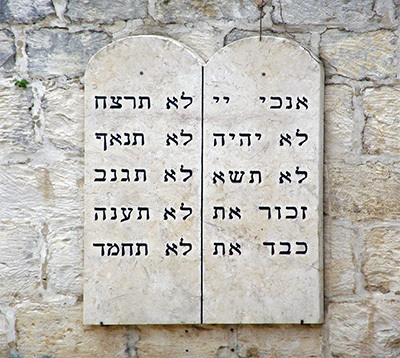The Ten Commandments


The Ten Commandments
There is no such thing as the Ten Commandments. At least our ancestors did not call them the “Ten Commandments.” Why would they? Not all 10 of them are commandments. Take the first one, for example: “I am God.” That is a statement, not a commandment. Our ancestors noticed the difference.
In Hebrew, the name of what we in English call the Ten Commandments is “Aseret Hadibrot,” which means the Ten Utterances or the Ten Statements or the Ten Declarations. Here they are in brief just to refresh your memory:
- I am God
- You shall have no other gods but me
- Don’t take God’s name in vain
- Remember the Sabbath (Shabbat)
- Honor your father and your mother
- No murder
- No adultery
- No stealing
- No false testimony
- Don't covet

Of these ten, which do you think is the most important? I can tell you which I think is the least obvious and also the most insightful. Least obvious because if you assembled a random group of people who did not know of the ten commandments and asked them to write ten, it is unlikely they would come up with this one. And most insightful—because it is this commandment that is the most psychologically astute. It is the tenth one: You shall not covet. The Hebrew, lo tachmod, means “do not be obsessively jealous.” In full it reads:
You shall not covet (be obsessively jealous of) your neighbor’s house. You shall not covet your neighbor’s wife, nor his servants, nor his cattle, nor anything that is your neighbor’s.
This commandment is amazing! It tells us so much about human nature. First of all, consider what a house was like 3500 years ago, when the Torah was written. A shack? A cave? A hut? What could possibly have been so nice about your neighbor’s “house” that you would be jealous? Nicer dirt on his or her floor? There must be something in human nature that makes us envy our neighbors, acquaintances and even strangers, regardless of whether their lives are substantively better.
Also noteworthy here is that the Torah rarely dictates how we should feel. Much more commonly the Torah instructs us on behavior. So why is it that in this one commandment we are told how we should not feel?
The instruction seems to be precautionary. If you are jealous of the other then that jealousy could lead to regrettable behavior. And if you are jealous of the other then you are missing out on the gifts of your own life. Judaism wants us to count our blessings, to be grateful for what we have. The Talmud instructs: “Who is rich? The one who is grateful for what she/he has.”
Shavuot is coming. On that holiday we study and chant the Ten Commandments. Let us rejoice, on that day and every day, in the gifts of our lives! Maybe then, instead of worrying about what our neighbor might have that we lack, we will worry about what others may lack and how we can help them out.